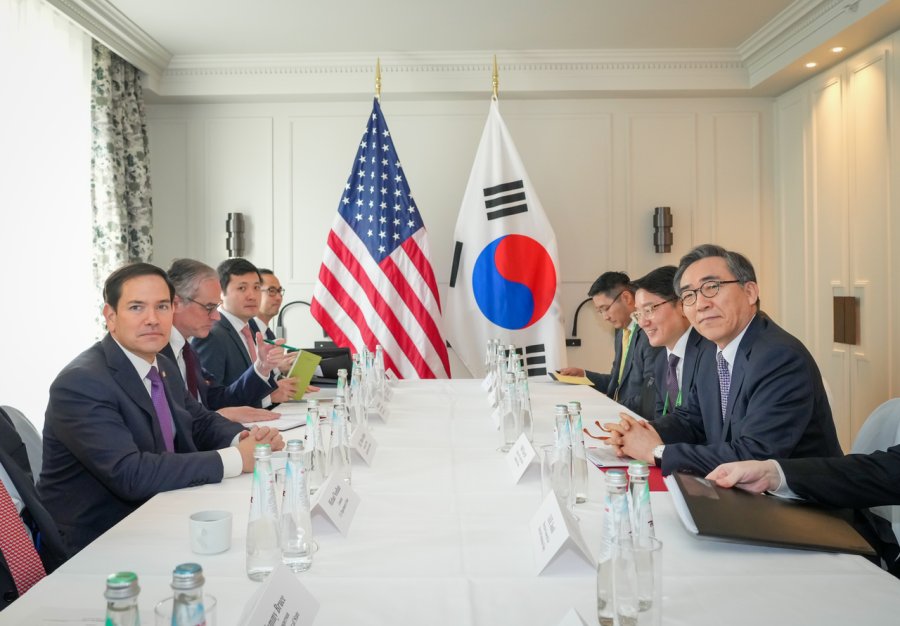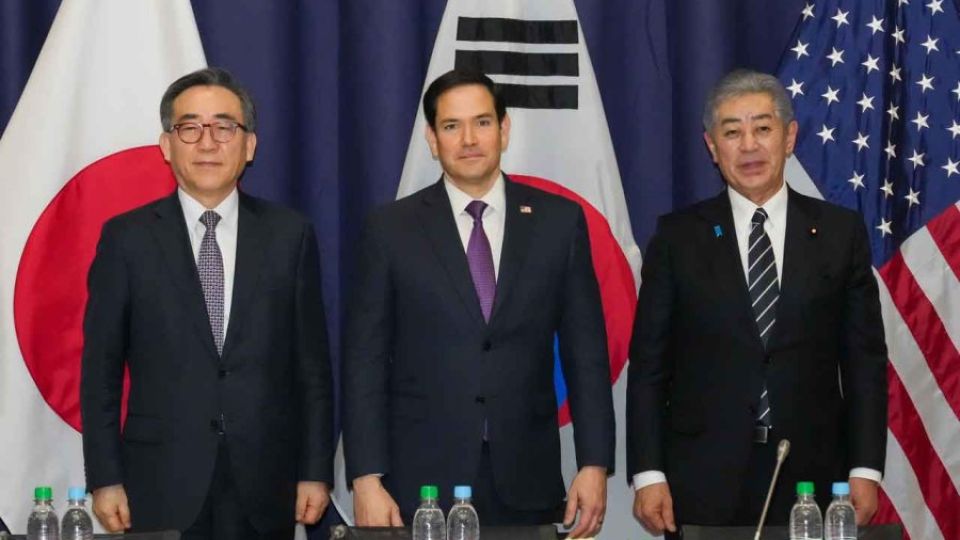February 17, 2025
SEOUL – The Trump administration has set forth a commitment to North Korea’s “complete denuclearization” and to the preservation of sanctions and pressure to that end in a joint statement with South Korea and Japan, assuaging Seoul’s mounting concerns over Washington’s potential shift in North Korea policy.
The joint statement came after the first meeting among South Korea’s Foreign Minister Cho Tae-yul, US Secretary of State Marco Rubio and Japanese Foreign Minister Takeshi Iwaya on Saturday, on the sidelines of the Munich Security Conference. The meeting was followed by the first-ever bilateral meeting between Cho and Rubio earlier in the day.
“The Secretary and Foreign Ministers reaffirmed their resolute commitment to the complete denuclearization of the Democratic People’s Republic of Korea (DPRK) in accordance with the United Nations Security Council Resolutions (UNSCRs),” the English-language joint statement read, referring to North Korea by its official name.
“They also committed to maintain and strengthen the international sanctions regime against the DPRK by responding firmly to violations and evasions of the relevant UNSCRs and applying pressure on Pyongyang to halt illicit activities that fund its nuclear and missile programs.”
Seoul’s fears have also been intensified by US President Donald Trump’s reference to North Korean leader Kim Jong-un — whom he met three times for summits from 2018 to 2019 — on his Jan. 20 inauguration day, and US Defense Secretary Pete Hegseth’s labeling of North Korea as a “nuclear power” during his January confirmation hearing.
The phrase “nuclear power” differs from the meaning of “nuclear-weapon state” in the Treaty on the Non-Proliferation of Nuclear Weapons, or NPT, used for the five internationally recognized nuclear-weapon states: the US, the UK, France, China and Russia.
But Trump and Hegseth’s invocation of the unofficially used term “nuclear power,” whose implications can be arbitrarily interpreted, has resulted in a frenzy of controversy in Seoul regarding the true intent behind the use of the term by the second Trump administration, perturbing Seoul.

Foreign Minister Cho Tae-yul (right) poses with US Secretary of State Marco Rubio (left) ahead of their first in-person talks held on the sidelines of the Munich Security Conference on Feb. 15. PHOTO: REPUBLIC OF KOREA MINISTRY OF FOREIGN AFFAIRS/THE KOREA HERALD
Seoul’s Foreign Ministry emphasized the significance of the stated goal of pursuing North Korea’s “complete denuclearization” in the joint statement endorsed by the second Trump administration.
“It’s been all talk and no action, but this document creates a basis that no one can deny,” a Foreign Ministry official told reporters on Saturday in Munich on condition of anonymity.
Another government official, also speaking anonymously, said of the trilateral joint statement, “A document has now set out the (Trump administration’s) basic principle for addressing North Korea issues,” adding that the administration’s “policy direction has been clearly outlined” in the statement.
The expression “complete denuclearization” of North Korea, which also appeared in the US-Japan joint leaders’ statement, marks a distinction from the Biden administration’s phrasing of “complete denuclearization of the Korean Peninsula.”
The latter expression was controversial, as it could be interpreted as aligning with North Korea’s long-established claim that a nuclear-free peninsula should include preconditions such as a halt to the deployment of US strategic nuclear assets from the region.
This is not the only time the Trump administration has expressed a commitment to the “complete denuclearization” of North Korea. A separate statement issued by the State Department on Saturday on the outcome of the South Korea-US foreign ministerial meeting also reaffirmed the principle.
However, it differed from the press statement released by Seoul’s Foreign Ministry. Washington additionally expressed its willingness to engage with the Kim Jong-un regime and included China as a discussion topic — points that Seoul did not mention in its statement.
“Secretary Rubio reaffirmed America’s commitment to the complete denuclearization of the DPRK while expressing the Trump administration’s openness to dialogue,” US State Department spokesperson Tammy Bruce said of the Rubio-Cho meeting.
“The two shared concerns over China’s aggression in the South China Sea and discussed how to deter DPRK aggression.”

US Secretary of State Marco Rubio (right) shakes hands with South Korean Foreign Minister Cho Tae-yul before a trilateral meeting with Japanese Foreign Minister Takeshi Iwaya held on the sidelines of the Munich Security Conference on Feb. 15. PHOTO: US STATE DEPARTMENT/THE KOREA HERALD
The trilateral joint statement also included an unprecedented message targeting China, in addition to oft-repeated China-related rhetoric, notably stating, “They also expressed support for Taiwan’s meaningful participation in appropriate international organizations.”
This was the first time such a phrase has appeared in a trilateral joint statement at any level.
The first unnamed Foreign Ministry official further explained that the clause “refers to possible participation in international organizations that do not recognize statehood.”
For instance, Taiwan has previously participated in a WHO annual session as an observer, but has not done so since 2017, and was briefly invited to an International Civil Aviation Organization Assembly in 2013 but later did not attend.
The official also disclosed that South Korea requested the addition of the word “appropriate” to the trilateral statement, distinguishing it from the US-Japan leaders’ statement.
The clause largely echoed the joint statement issued following talks between Trump and Japanese Prime Minister Shigeru Ishiba, which stated, “The two leaders also expressed support for Taiwan’s meaningful participation in international organizations.”
However, the Foreign Ministry official clarified that South Korea still respects the “One China policy,” emphasizing that “our basic stance on Taiwan has remained unchanged.”


